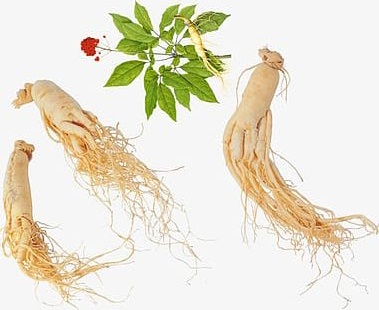Your cart is currently empty!
What is Ginseng?
Ginseng is an herb that grows in different countries, with eleven different varieties of short, slow-growing perennial plants with fleshy leaves. Herb comprises light-colored, forked-shaped roots, relatively long stalk, and green leaves with an oval shape.

Ginseng is one of the most popular natural remedies for the enhancement of general well-being. Both American and Asian ginseng provides an energy boost, lowers blood sugar and cholesterol, treats diabetes, reduces stress, promotes relaxation, and treats sexual dysfunction in men. It must be noted that Siberian ginseng is not the true ginseng and does not belong to the genus “Panax” and belongs to the Araliaceae family of plants and does not have the same benefits as American or Asian Ginseng.
History of Ginseng
The word ginseng arises from the Chinese term ‘rénshen”, which literally translates into “man root” because the roots of the plant look like the legs of a man.
Since five thousand years ago, in the mountains of Manchuria, Chinese ginseng was commonly used for its revitalizing powers. The herb was reflected as a symbol of divine harmony and its human-shaped was highly desirable. Ginseng was widely grown in the mountains of Manchuria.
The first time, the benefits of ginseng were documented during China’s Liang Dynasty (220 to 589 AD).
Earlier emperors have used it not only for all illnesses but also used it in soaps, lotions, and creams.
In the third century A.C., the demand for ginseng boosted internationally in the trade of the herb from other parts of the world in exchange for silk, etc.
In 1716, Jesuit priest in Canada heard that ginseng is much popular in China, so he started searching it in the areas of French Canada, environmentally similar to Manchuria.
After three months’ efforts, he found the herb nearly the same as Asian ginseng near the city of Montreal, and the herb he found became known as American ginseng.
Soon after the discovery herbalists and botanists found that it was very common in all the areas of deciduous forests of the eastern United States and then export of the American ginseng to china began to explode.
Soon herb considered an endangered species while farmers started cultivating this sensitive herb in the The 1970s. Currently, the state of Wisconsin, especially in Marathon County, produces near about 95% of American ginseng and is also widely grown in the province of Ontario, Canada.
People use ginseng capsules, tea, and powder for stress management, to boost immunity, and as a stimulant. It is also used to fight infections such as cold and flu. Some studies show that it helps to control cold and flu and makes the symptoms milder when infection occurs.
Ginseng is also used for some other infections including HIV/AIDS, infections of the intestine, and especially infections that are common in people having cystic fibrosis.
People moreover use ginseng for the improvement of the digestive health, for loss of appetite, vomiting, inflammation of the colon and inflammation of the lining of the stomach.
Ginseng is also used for diabetes, insulin resistance, low iron in the blood (anemia), cancer-related fatigue, high blood pressure, sleeping problems (insomnia), nerve pain, erectile dysfunction (ED), fever, hangover symptoms, attention deficit hyperactivity disorder (ADHD), fibromyalgia, hardening of the arteries, memory loss, rheumatoid arthritis, schizophrenia, improving, athletic performance, improving mental performance, anti-aging aid, menopausal symptoms, complications during pregnancy or childbirth, and for nervous exhaustion.
Ginseng is also used as an ingredient in soft drinks, energy drinks, cosmetics, and soaps.
How does it work?
Ginseng comprises chemicals known as ginsenosides those having impact on insulin levels in the body and reduce blood sugar. Other chemicals known as polysaccharides may also affect the immune system.
Health Benefits of Ginseng
Ginseng is one of the most popular and widely used herbal supplements in the world.
Energy Booster
Ginseng helps in stimulating the physical and mental energy is weak and tired people. It also provides great energy to athletes, sports players, and bodybuilders.
Cognitive Function
Ginseng improves thinking ability and cognitive function. It improves the focusing ability and overall mental health.
Ginseng has seven constituents, ginsenosides, which have immune-suppressive effects which target different levels of immunological activities resulting in the anti-inflammatory action of ginseng in humans.
Cancer Prevention
Ginseng has substances that have anti-cancer properties. After being diagnosed the breast cancer the use of ginseng improves survival chances and quality of life.
Erectile Dysfunction
Men use ginseng to treat erectile dysfunction. Ginseng has a long history as an excellent aphrodisiac and is a natural alternative medicine for libido and erectile dysfunction. It stimulates sexual desire and erection by increasing the blood flow circulation.
Flu and RSV
Taking ginseng by mouth may reduce the risk of getting a cold or the flu but it does not reduce the flu symptoms of the length of the illness. A study showed that the use of ginseng extract improved the survival chances of human lung epithelial cells infected with the influenza virus.
Possible side effects of taking Ginseng
Although ginseng is considered a safe herb to use but some people may face the following side effects;
- Elevated heart rate
- Difficulty in sleeping
- Restlessness
- Nausea
- Headaches
If you face any of the above sides effects, stop the use or reduce the dose of ginseng. But if you will consume Ginseng with milk then you will also be safe from these side effects.




